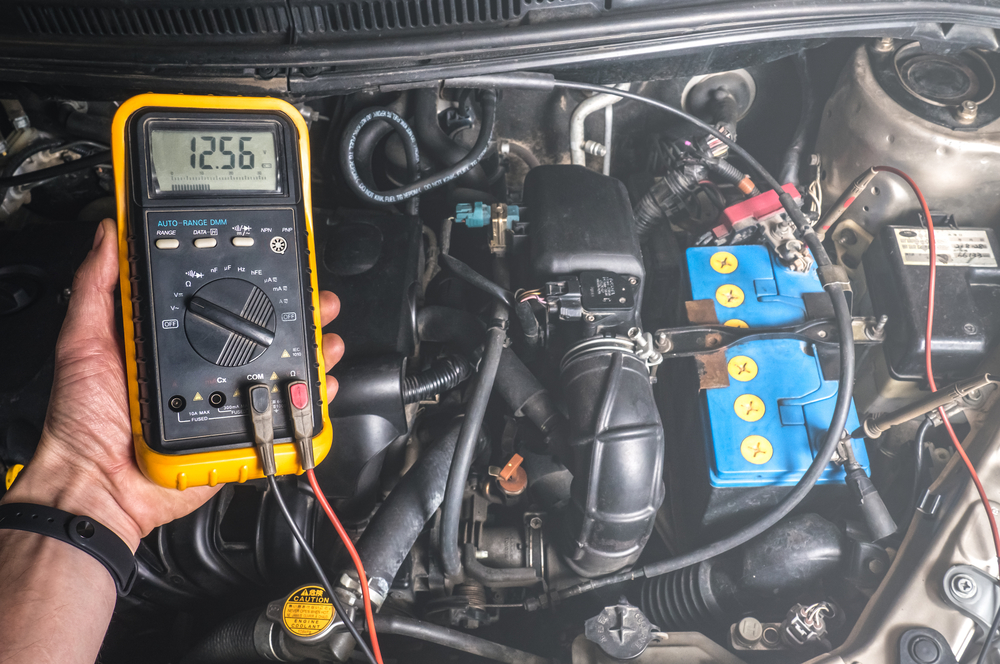
The Ford F-150 is one of the country’s top-selling pickup trucks and has been for a long time. Depending on the model year and the model, these trucks use three sizes of battery – the H6, H7 and H8. That begs the question though: which type is best? The Optima yellow top, the one from AC Delco, or how about the one from Walmart?
Since F-150 owners can purchase from a variety of sources, who provides the best batteries? And what determines that? Is it the number of months or years a battery will last? Does a free replacement warranty edge the competition? How about famous customer service or cost savings?
All of these things can go into determining an individual preference for a certain type. Your truck rolls off the line with an OEM power unit that will last for four to seven years, depending on the conditions under which the truck is stored and used. Just like choosing the correct truck insurance for your F-150, you should choose the right battery when it’s time for a replacement.
Importance of a Good Battery
Choosing a good battery for your Ford F-150 means thinking about how much power you will need, the kind of performance you expect and any specific needs you may have. For example, will you be towing an RV? Your battery will need to have the ability to meet the challenge.
Where you live is important as well. If you live in a place where extreme weather conditions are normal whether that’s high temperatures or low, you’ll want to pick one that operates well under that type of duress. If you expect your truck to maneuver through rugged terrain or places with unique features, such as hills, that should go into the equation.
Understanding Battery Requirements
As you venture into choosing a battery for your F-150, you’ll need to be familiar with some of the terms surrounding requirements and how batteries work.
Watt-hours
This is the standard of measurement and tells you how much energy your battery will provide in an hour. Researching this measurement can tell you a lot about your power source, including performance.
Capacity
Measured in milliamp-hours (mAh), this term refers to how much charge a battery can hold. Understanding your capacity can give you a rough idea of how long it will last. Here’s a formula:
mAh/Amps = Hours
The higher mAh, the longer it will last.
Energy
Energy density and specific energy measure how much energy a battery contains relative to its size and weight.
Power
Power measures the rate an electrical current moves through a battery. Measured in watts or a C-rate, the higher the C-rate, the more punch.
Electrodes
The anode and cathode are two electrodes that ease the passage of an electric charge. An electrolyte is a substance that transports a charge between the anode and the cathode.
Envelope Separator
This is a permeable membrane placed between the electrodes. It that allows for the transfer of important electrolytes but keeps the anode and cathode from touching.
Other terms that are important include cycle and calendar life, charge rate, swell rate and impedance.
What is the Best Battery for a Ford F-150 Based on Vehicle Specifications?
If you’ll be using your truck to drive into town and haul a couple of hay bales back out to your small herd, power and performance may not matter as much to you as to someone who is using their F-150 to move heavy equipment or haul a trailer full of horses. The amount of power you need has a direct bearing on choosing the right one.
Newer model years are equipped with a powerful V6 engine that calls for a good and reliable power source, even in cold weather. Here are a few things to consider:
- Group size: For the Ford F-150, the best group size depends on the year and model, but is either an H6, H7 or H8.
- Cold cranking amps (CCA): The CCA number is how many amps a battery can support for 30 seconds at 0 degrees. An important number to understand if you will use your truck in extreme cold.
- Reserve capacity: How long your battery will charge the vehicle’s electrical system if the alternator fails.
Load Consumption Analysis
Understanding which type is the best battery for a Ford F-150 is a good idea before you purchase a replacement. Keep reading to find out the reason you may choose to use a different kind.

Types of Batteries Suitable for Ford F-150
The types of batteries available for your pickup have increased as technology and design have moved into more efficient, less maintenance power sources. Besides powering the actual truck, your power source also has to take care of all the accessories and systems, including lights, headlights, your cell phone and your air conditioner and heater.
Lead-Acid Batteries
These are an excellent choice and have been the standard for many decades. With the ability to release power quickly, they are popular especially with those who want their trucks to start on a really cold day.
Conventional Flooded Batteries
Traditional wet-flooded batteries are filled with battery acid and need a higher level of maintenance than some other types, although they are cheaper over the life and provide a high ROI.
Deep Cycle Battery
Deep cycle batteries have thicker lead plates than a conventional one. Although you won’t have the same power bursts, a sealed deep cycle can withstand the constant vibration associated with recreational vehicles.
Absorbent Glass Mat (AGM) Batteries
Basically a maintenance free version of the traditional flooded lead-acid batteries. They offer a long service life with a high current delivery, but have a higher upfront cost. Unlike conventional types, these are less hazardous since they are spill proof.
Gel Cell Batteries
These use a gel-like substance that is also spill proof, but produces less dangerous fumes. You won’t see fluid leaks, but your upfront cost may be more.
Lithium-Ion Batteries
Lately, Ford has been introducing F-150s that are capable of using the newest technology – lithium ion. The best part of this power source is that it’s rechargeable, much lighter and longer lasting than conventional. Currently, these batteries are not recommended for temperatures below freezing.
For all equipment and devices with lithium-ion batteries, experts have begun suggesting using the 4-80 rule, which simply states you should not let your batteries run completely out and then charge them completely up, but rather keep them somewhere in the 40-80 percent for longest life.
Factors to Consider When Choosing
As we mentioned, there are many factors to take into consideration when choosing the best battery for a Ford F-150. Let’s take a look at a few of them.
Climate and Weather conditions
Even if you live in a place with extreme weather, you want a long life out of your battery. According to Consumer Reports, you may be surprised to find out that hot weather is worse than cold. If you aren’t aware of this and don’t perform the required steps to take care of your battery, you may find yourself calling for roadside assistance for a tow to the service center.
Driving Habits and Usage Patterns
Whether you mostly drive on the highway, in the city or a combination has a direct impact. Additionally, not driving takes a bigger toll than frequent driving.
Similarly, driving slower for longer distances can save you up to 14%, according to the Department of Energy. Here are some other tips to help you get a longer life:
- Don’t use tap water to fill a conventional battery
- Turn off things such as the air conditioner, radio, lights while your car is idling
- Take your truck in for regular servicing
Maintenance Requirements and Lifespan
You’ll not only save money on batteries, you’ll save money on your vehicle overall when you familiarize yourself with the maintenance requirements and service intervals. This valuable information can be found in your manual – or online.
How Often Should I Replace My Ford F-150 Battery?
Your Ford F-150 power unit should serve you for anywhere from two to seven years. That’s a huge span, but a lot of factors determine the answer. Some of the factors that affect lifespan include:
- Type and brand
- Power output
- Extreme weather
- Usage
- Maintenance
That’s why it’s important to understand the constant pressure you will be putting your power source under and how that affects what is the best battery for a Ford F-150.
Regular Inspection and Cleaning
It doesn’t take much time to have a regular inspection and maintenance check and it’s one of the best things you can do on a regular basis to extend the life. This is especially important if you have a battery that needs refilling. You may have a dashboard indicator light for low battery fluid level, but it’s best not to get to that point.
Testing Battery Health and Voltage
You don’t want to wait for your Ford to stall or the check engine light to come on before you do servicing. Investing in an autoranging multimeter allows you to do this critical step at home and will alert you early on to any issues.
- Turn off your truck and all accessories, such as lights and radio.
- Place the red lead on the positive terminal (red cover or a + symbol).
- Place the black lead on the negative terminal.
- If your measurement is below 12.6 volts, it may be time to go shopping for a new, powerful battery.
If your truck has been sitting for awhile, it’s a good idea to take it for a long drive periodically. This helps to keep your battery charged.
Ensure a Safe Trip with Freeway Insurance
Now that you understand how to find the best battery for your Ford F-150, we can help you get the best truck insurance. At Freeway Insurance, we work with you to find the best coverage at the cheapest price. Give us a call at (800) 777-5620, reach out to us for a fast car insurance quote online or stop by one of our convenient locations.


